Prince Philip did little to hide his ‘disdain’ for Charles who he believed ‘lacked the dedication necessary to make a good king’, a royal insider has claimed.
It is no secret that King Charles had a testy relationship with his father.
Their clashes during Charles’s childhood were dramatised for the hit Netflix series The Crown where the young prince was dressed down by his father for being ‘too weak’ after he struggled to fit in at Gordonstoun boarding school.
While time healed the rift between the family members and by all accounts Charles and Philip were close in the Duke of Edinburgh‘s final years, throughout adulthood they struggled to get on with Philip doing very little to disguise his feelings.
Writing in his biography, Philip: The Final Portrait, broadcaster and royal author Gyles Brandreth claims that during his meetings with the Duke in the 1980s and 1990s there was a ‘touch of exasperation in his tone – and often, too, a note of sarcasm’ when he talked about Charles’.
‘The Duke gave the impression that he would have liked his son to be more robust, less fey,’ Gyles added.
Gyles notes that Philip often did very little to hide how he felt about the heir to the throne even when speaking to members of the public.
The royal expert recalls a meeting with Philip in 1986 where the Duke was presented with three pairs of carriage driving gloves as a gift from the Playing Fields Association all in different colours.
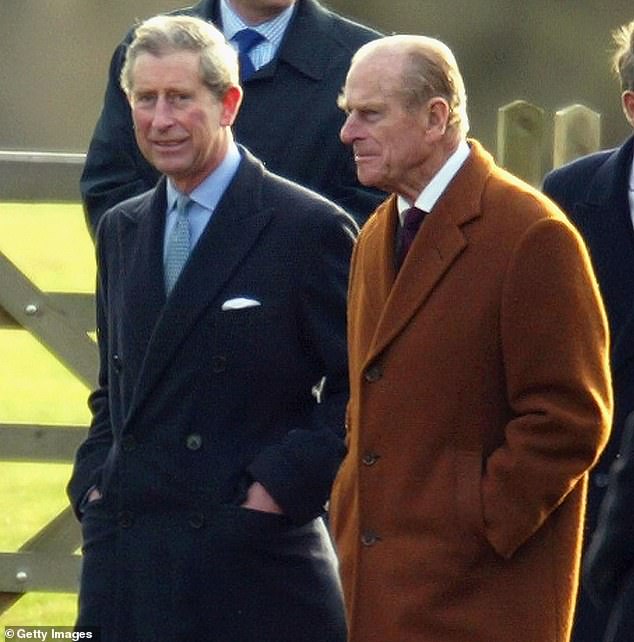
Charles with Philip on Christmas morning in December 2003. Philip allegedly felt Charles lacked the ‘dedication necessary to make a good king’
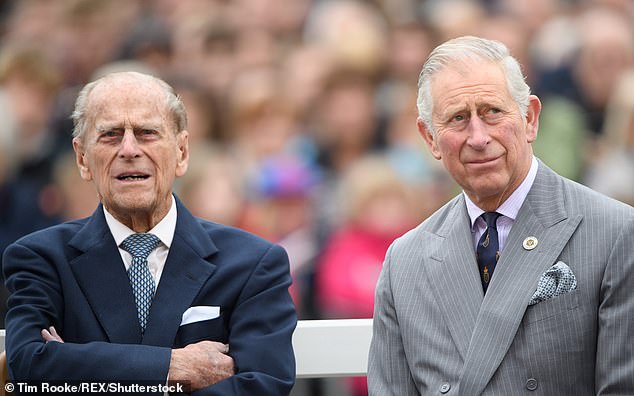
The Charles and Philip in October 2016. It is no secret King Charles III had a testy relationship with his father
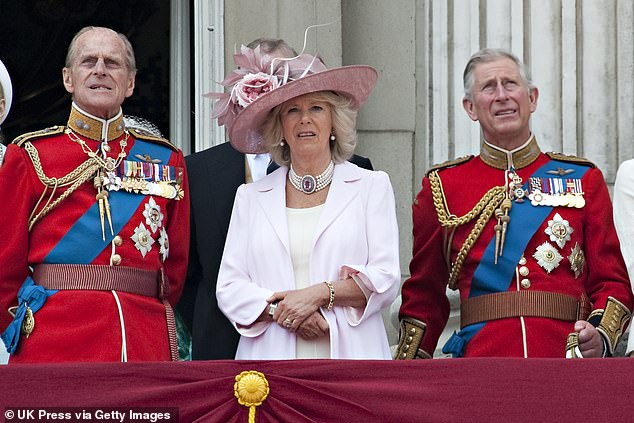
Philip with Camilla and Charles in June 2010. Throughout adulthood the father and son struggled to get on with Philip doing very little to disguise his feelings
Third pair were a garish lilac colour which Philip held ‘disdainfully’ and said “I think we’ll give these to the Prince of Wales”.
Philip even allegedly felt that Charles lacked the ‘dedication necessary to make a good king’ especially after the death of Princess Diana.
Speaking to Gyles on another occasion Philip acknowledged their similarities but noted their key personality difference was that Charles is a ‘romantic’ and he was a ‘pragmatist’.
Charles did not lack a close father figure in his life, with Philip’s uncle Lord Louis Mountbatten taking up the reins.
Lord Mountbatten had a large influence on Charles as he came of age, serving as a mentor to the future king.
Charles often lent on Mountbatten for advice as he navigated his duties as a young royal and he also willingly accepted criticism from his uncle.
Mountbatten was the only family member to attend the prince’s 1971 graduation from the Royal Naval College Dartmouth.
Tragically, Mountbatten was murdered aged 79 when the IRA blew up his boat during a holiday at his summer home in Sligo, on the west coast of the Republic of Ireland, in August 1979.
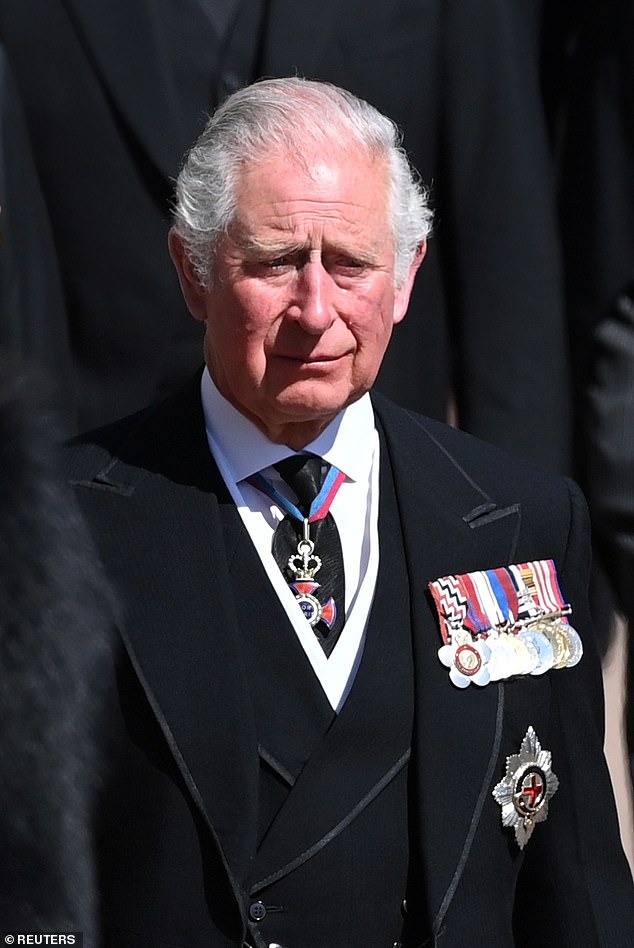
Philip felt that Charles was a ‘romantic’ and he was a ‘pragmatist’
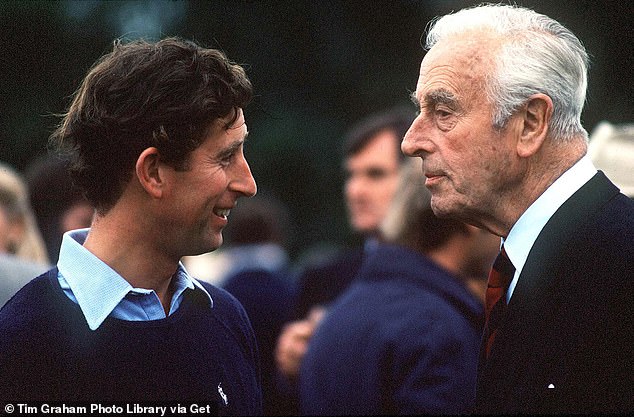
Charles with Lord Mountbatten. He had had a large influence on Charles as he came of age serving as a mentor to the future king
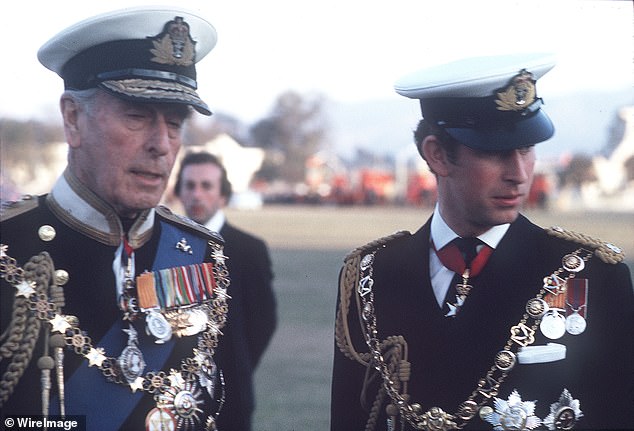
Charles with Lord Mountbatten in 1975. Charles often lent on Mountbatten for advice as he navigated his duties as a young royal and he also willingly accepted criticism from his uncle
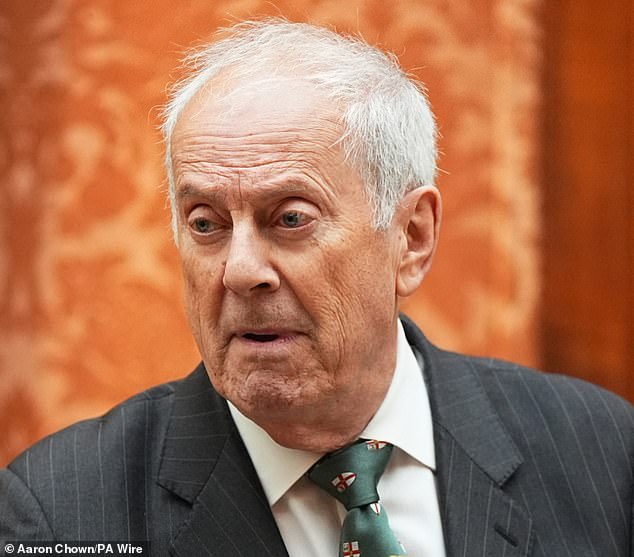
Broadcaster and author Gyles Brandreth notes Philip often did very little to hide how he felt about the heir to the throne
On the day of his funeral at Westminster Abbey, Charles marched behind his great-uncle’s coffin.
According to his wishes, Mountbatten was later buried at Romsey Abbey in Hampshire.
Charles left a wreath of red roses and carnations, with a message that read: ‘To my HGF and GU from his loving and devoted HGS and GN.’
The words were family code, with Charles regarding great-uncle Mountbatten as his ‘Honorary Grandfather’, who had in turn referred to Charles as ‘Honorary Grandson and Great Nephew’.
It has been widely documented although Prince Philip had a testy relationship with Charles, the Duke was much closer to his only daughter Princess Anne.
Following his death the Princess Royal paid tribute to her father describing him as a ‘teacher, supporter and critic’.
Indeed, it is known that Anne was Philip’s favourite child with the two sharing a love for sports.
Speaking to the Daily Mail in 2017, Eileen Parker, wife of Philip’s close friend Mike Parker said:'[Philip] always had more fun with Anne.
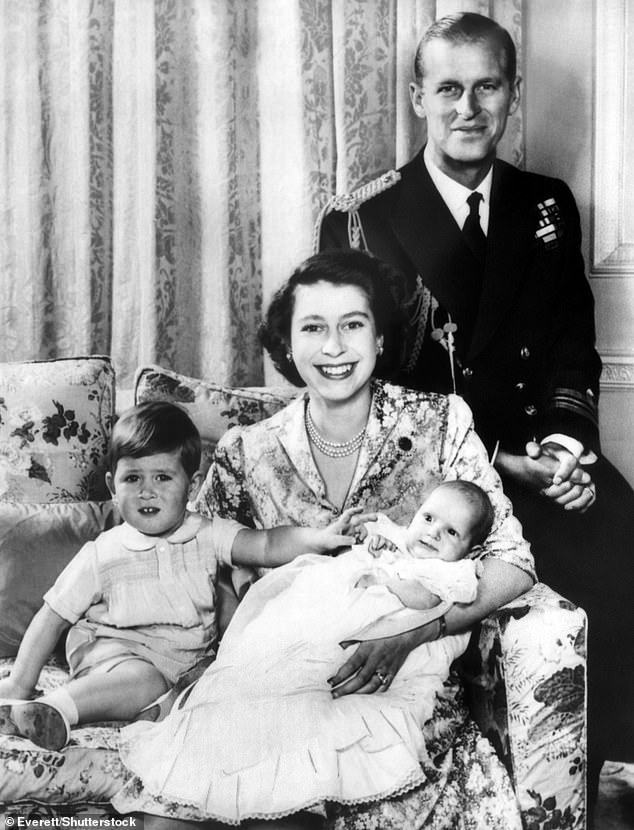
Prince Philip and Queen Elizabeth II with a young Charles and a baby Princess Anne in 1951
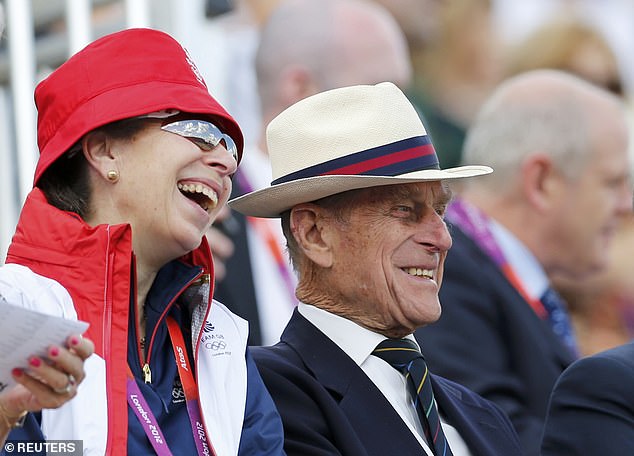
Anne and Philip share a laugh during the London 2012 Olympics. Indeed, it is known Anne was Philip’s favourite child with the two sharing a love for sports
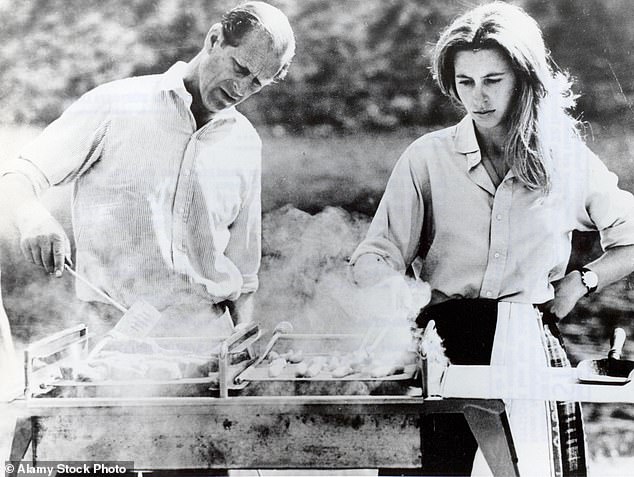
Philip barbecues with a young Princess Anne. Following his death the Princess Royal paid tribute to her father describing him as a ‘teacher, supporter and critic’
‘Charles is more like the Queen, while Anne is very like Prince Philip.’
Both the Duke of Edinburgh and the Princess Royal also shared a dedication to Royal duties with Philip.
Upon his retirement from royal duties on August 2, 2017, Philip had already become the longest-serving British royal consort, having spent more than 70 years by the Queen’s side.
He was also the patron of 800 organisations including, most famously, the Duke of Edinburgh award scheme.
Meanwhile, Anne appears to have inherited her father’s work ethic with the Princess carrying out 217 engagements in 2024 making her by some accounts the hardest working member of the Royal Family.
While Philip and Charles’s became closer in later life, the same could not be said for his relationship with his other son Prince Andrew who the Duke felt never lived up to his expectations.
Prince Philip was particularly delighted with his son’s naval achievement. Having fought against Nazi Germany as part of the Royal Navy, he had reason to be pleased with his son’s victory in the Falklands War.
However, royal biographer Ingrid Seward revealed in her bestselling book, My Mother And I, that Prince Philip later ‘berated’ Andrew for being ‘pointless’ because he never fulfilled his early potential.
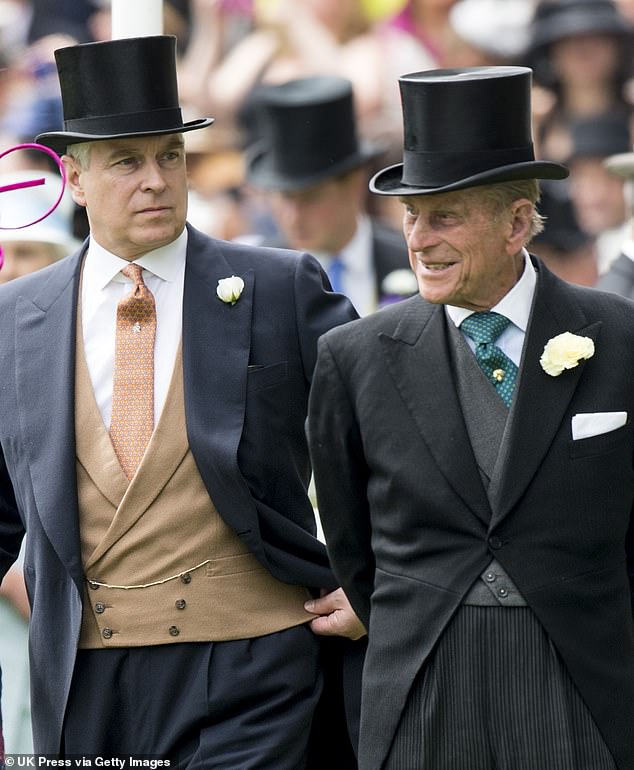
Prince Philip and Prince Andrew at Ascot in 2014. The Duke of Edinburgh felt that Prince Andrew never lived up to his expectations
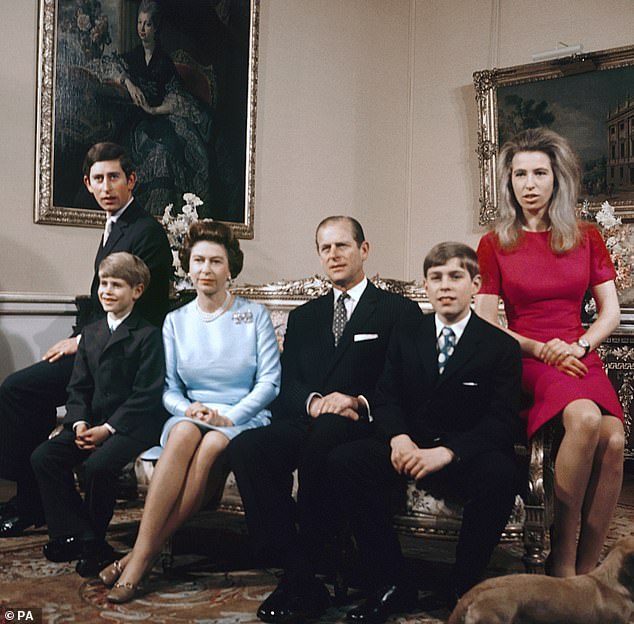
The Queen and Prince Philip with their children in 1972. Philip is understood to have shared a close bond with his youngest son Prince Edward
It is likely that Philip’s scathing comments about his son were in reference to Andrew’s actions outside of the military.
During the 1980s ‘randy Andy’ – as the press called him – gained a reputation for being the ‘playboy prince’ during his bachelor years, with Andrew linked romantically to a string of models and actresses.
While he did eventually settle down and marry Sarah Ferguson in 1986, their marriage was short-lived and ended in separation in 1992 and divorce four years later.
Since he left active service in the navy in 2001, Andrew’s ventures came under intense scrutiny.
Seward wrote that during his time as the UK’s Special Representative for International Trade and Investment he gained a reputation for ‘tailoring his visits to include trips to luxury golf courses and fraternising with “dodgy” Arab businessmen’.
After the government at the time realised the damage caused by Andrew’s actions, he was forced to resign from his role in 2011.
While for many years Andrew was celebrated as the royal family’s ‘scallywag’, royal biographer Robert Lacey wrote that the Prince’s ‘dubious choice of business contacts came to shadow his reputation’.
This culminated with Andrew stepping down from his role as a working member of the Royal Family following his notorious interview with BBC Newsnight about his relationship with convicted sex offender Jeffrey Epstein.
Similar to his relationship with Princess Anne, Philip is understood to have shared a close bond with his youngest son Prince Edward.












